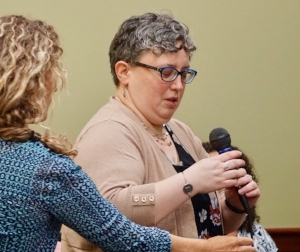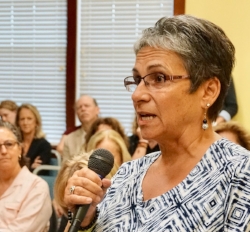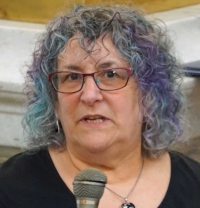'Our Lives Turned Upside Down' When Daughter Entered RI Adult DD System, Mother Says
/Louis DiPalma, Rebecca Boss, and Kerri Zanchi watch A. Anthony Antosh of Rhode Island College present consumer and family perspectives on the state’s services for adults with developmental disabilities Photo by Anne Peters
By Gina Macris
A Rhode Island Senate study commission spent nearly two hours Dec. 12 laying out a catalog of strengths and weaknesses in Rhode Island’s system for helping people with developmental disabilities.
But in the end, the personal stories of two mothers, Amy Kelly of Smithfield and Martha Costa of Portsmouth, focused the commission’s attention on the crises now unfolding for at least several families who are at their wits end.
In the catalogue, their experiences come under “residential services-need for specialized medical/behavioral residential models.”
For Amy Kelly, that means that every single service provider in Rhode Island – about three dozen - has turned away her 21 year-old daughter, who is autistic, has behavioral problems, and functions in many ways as a kindergartener.
“So now what do I do?” Kelly asked in a letter to the commission chairman, Sen. Louis DiPalma, D-Middletown. Kelly is a widow, and works fulltime. Her daughter, Kayla, was asked to leave the Trudeau Center in Warwick because of injuries to staff.
For a month now, Kayla has been at home all the time and her problematic behaviors have intensified, Kelly wrote. “She is out of her routine, asking for “friends,” “yellow bus,” “trip,” and other favorite things and experiences that she misses..
Kelly has been forced to choose “self-directed” services, meaning that she must find her own workers,“which is pretty much impossible,” she wrote to DiPalma.
And the Home Based Therapeutic Services that helped Kayla outside of school hours while she was still in special education are no longer available.
“I cannot believe there are no programs in RI for families in this situation!” Kelly wrote. “When my daughter turned 21 in May everything in our lives turned upside down.”
Martha Costa * courtesy of Capitol TV
Martha Costa agreed. She attended the Commission hearing at the State House on behalf of her own family and five others in Portsmouth who have become friends as their children have faced behavioral challenges growing up and have aged out of the school system into purview of the state Division of Developmental Disabilities (DDD).
As the mother of a 22 year-old man on the autism spectrum, she said her experience has been that once young people with complex needs turn 21, “there is really no place for them to go.”
The family might be told to go to a hospital, but with the exception of Butler Hospital in Providence, a mental health facility, “the hospital is horrible, because it’s just more trauma going there.”
The 21 year-old daughter of a friend of Costa’s had meltowns after her mother – her primary caregiver and the one who organized her services - died in September. The woman’s daughter, who has multiple disabilities, was hospitalized because there was “nowhere for her to go,” Costa said. The young woman was “restrained, medically and physically. It’s heartbreaking,” Costa said.
“It’s lucky you have good parents who are helping these kids, but you know, we’re all getting older and we’re not going to be able to,” she said. The aging of parents, who are often primary care givers, is a broad concern among families, according to survey results.
“There are some kids who don’t have that parent support and they’re on the street,” Costa said. “That’s sad, when they can be a very productive part of our community.”
Kerri Zanchi, the state’s Director of Developmental Disabilities, thanked Costa for coming forward.
One of the biggest challenges in residential services, Zanchi said, is a dearth of specialized homes for individuals with behavioral and other complex needs, as well as a lack of therapists and other clinicians to give them the proper attention.
“There’s a huge need coming” as teenagers with complex disabilities leave schools, she said. “We need to know what that need is and we need to start working on it lot earlier than when they turn 21 and come into our system.”
Zanchi referred to the division’s Eligibility by 17 policy, which aims to give families, schools, and the adult system plenty of time to plan a smooth transition.
In the catalogue, one of the “challenges” the state officials listed in implementing the Eligibility by 17 policy is “resource and service difference for transitioning youth vs adult services.” In the summary that family and consumer representatives submitted, they commented that “transition from high school is a ‘nightmare.“
Zanchi continued her response to Costa. “We certainly recognize every day the crises we have to manage” in order to support the individuals involved and to try to grow the system’s capacity, she said.
And there are committed providers who are willing to help the state, but who also want to do that with the right staffing that will keep all individuals safe, Zanchi said. “We are all hands on deck. I know it probably doesn’t feel like enough,” she said.
Costa agreed. “ I understand what you’ve been doing and I know that everyone has been working hard . Still, it’s not enough,” she said.
Gloria Quinn, executive director of West Bay Residential Services, said her agency works very well with the state as a partner in exceptional situations, but it is extremely difficult as long as there there is a paucity of established expertise in the community that is accessible to the developmental disabilities providers.
“Very often we are creating something new, which takes an enormous amount of time,” Quinn said, and the funding is not enough. Most importantly, when the agency helps someone with increased needs it runs the risk of jeopardizing supports for other people, particularly in a residential setting, she said.
Peter Quattromani, President and CEO of United Cerebral Palsy Rhode Island, pointed to the low wages for direct care staff that frustrate all involved; those who love the work but can’t pay the bills, employers who can’t fill jobs, and consumers and families who can’t find suitable services.
“It’s an incredibly difficult job” , he said, and attracting staff is likewise very difficult, given the low wages.
Commission member Kelly Donovan, who herself receives services from DDD, had sparked the conversation by wondering aloud why those with serious behavioral problems have difficulty finding appropriate support.
She said she agreed with Quattromani and Costa, and she added another factor that she believes contributes to the problem: a societal stigma against those with a broad range of mental illnesses who exhibit aggressive behavior.
During the last month, commission members, representing the executive branch of government, private providers, and consumers and their families, were asked to complete a survey cataloging the strengths and weaknesses of the existing Medicaid fee-for-service system, called Project Sustainability.
The commission plans to use the results of the survey, named the “Current State Assessment,” to seek advice from outside experts and further the group’s deliberations in the future, according to a statement issued at DiPalma’s behest.
Directly or indirectly, a lack of adequate funding in various contexts permeated three summaries of the survey results, each one presented by a representative of each of the three segments of the commission. Transportation, for example, has become a bigger problem now that there is a greater emphasis on community-based services, which require more than the two daily trips usually allowed by individual funding authorizations. Families also cited difficulties of non-English speakers in getting information and services.
But Rebecca Boss, director of the state Department of Behavioral Healthcare, Developmental Disabilities and Hospitals, also said the developmental disabilities budget has increased significantly since 2015, and listed advances made in the last two years, including:
$6.8 million for supported employment
two annual wage increases for direct care workers (The average hourly pay for front-line workers is $11.36 an hour)
the acquisition of a modern data management system
an increase in staff for quality management, implementation of a federal civil rights consent decree and for Medicaid-mandated Home and Community Based Services, as well as assistance in maximizing the existing budget.
She described the funding needs of the system as “dynamic.”
“We are engaging in discussions with our partners about what those needs are,” Boss said. “Governor (Gina) Raimondo has demonstrated a willingness to look at the system and make adjustments in the budget as we go along. So this is the process that we’re currently working on and engaging in those conversations on a regular basis.”
Raimondo is to present adjustments for the current budget, as well as her proposal for the next fiscal cycle, during the third week of January.
Christopher Semonelli, a commission member and the father of a teenager with complex needs, commented on the origins of Project Sustainability, which seemed to him like system “in a death spiral, and there was basically a feeding frenzy as to how to continue the system; how to go after the available funds.”
“I don’t think the legislative base should be blamed” for cutbacks that launched Project Sustainability in 2011, “because there was a lack of advocacy, “he said. “Strong advocacy could have prevented that from happening. That is huge and needs to be built going forward.”
DiPalma had the last word. Semonelli “made a great point about advocacy, but he shouldn’t let the General Assembly off the hook,” DiPalma said. “This is where the buck stops.”
Read the summaries presented at the meeting. For the state’s assessment, click here. For consumer and advocates’ comments, click here. For service providers’ comments, click here.



















